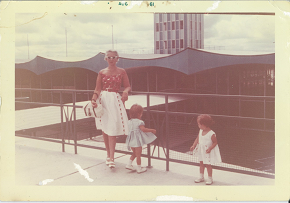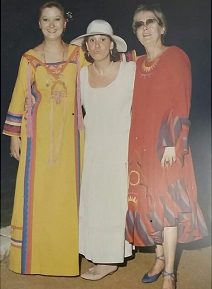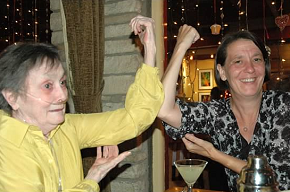Faces of COPD: 'We Did Survive' by Shelley Bueche
Posted on November 03, 2017 |
Sisters Shelley and Sherry Bueche were primary caregivers for their mother, Carolyn, once she was diagnosed with COPD. To learn more about their caregiving experience, read below.
At the age of 61, after 47 years of smoking, our mother, Carolyn Claypool Bueche, was diagnosed with COPD. She immediately quit smoking, but she still required supplemental oxygen. Tethered to an oxygen tank twenty-four hours a day, seven days a week, my sister Sherry and I immediately became our mother’s primary caregivers.
 We had our own children to care for, but Sherry and I didn’t think twice about it. Raised by our single mother in Austin, Texas, the three of us formed an extraordinarily tight bond when Sherry and I were children that remained unbreakable when we entered adulthood.
We had our own children to care for, but Sherry and I didn’t think twice about it. Raised by our single mother in Austin, Texas, the three of us formed an extraordinarily tight bond when Sherry and I were children that remained unbreakable when we entered adulthood.
Sherry and I were hands-on caregivers, picking up prescriptions, driving to and from medical appointments, taking dogs to the vet, shopping for groceries—you name it, we did it. Although our mother eventually employed an in-house assistant, my sister and I continued in the role of primary caregivers until her passing.
As our mother’s illness progressed, the nature of our caregiving duties changed from lifestyle maintenance to duties of an emotional nature, less physically intense but emotionally exhausting.
 We joined an online support group that, like many support groups, turned out to be worth its weight in gold. Emails with the subject line “Help, I am exhausted…”, “Can anyone give me advice regarding my mother’s new inhaler?” and “I think I am losing my mind!” caught our attention.
We joined an online support group that, like many support groups, turned out to be worth its weight in gold. Emails with the subject line “Help, I am exhausted…”, “Can anyone give me advice regarding my mother’s new inhaler?” and “I think I am losing my mind!” caught our attention.
We were grateful for all the information, advice and even frustrations shared within our support group. Perhaps most importantly, we knew we were not alone in helping a family member battle this horrible disease and made sure to make the most of every day.
Traveling as a family was very important to us. As anyone with a loved one on oxygen knows, transportation can be difficult but somehow Sherry and I managed. We took a cross-country trip on Amtrak (oxygen tubing stretching from roomette to roomette) from Austin to Chicago and back to Austin. It was a lot of trouble, especially when packing medications, but infinitely worthwhile.
 As our mother’s COPD progressed, eating and talking while trying to breathe became difficult. Yet we still planned trips including family cruises. During the last cruise, our mother was confined to a motorized wheelchair. When you think of crammed dining rooms with little room for maneuvering this could prove difficult, however it did make for some really funny moments!
As our mother’s COPD progressed, eating and talking while trying to breathe became difficult. Yet we still planned trips including family cruises. During the last cruise, our mother was confined to a motorized wheelchair. When you think of crammed dining rooms with little room for maneuvering this could prove difficult, however it did make for some really funny moments!
Sherry and I spent a lot of time with our mother towards the end of her life. After her last hospitalization, she was transferred to a hospice facility where, instead of battling her lung condition, my sister and I along with the hospice workers sought to ensure our mother’s comfort. Just before midnight on March 16, 2010, our mother peacefully passed away.
Our mother’s passing was a relief to Sherry and me as we could not stand to see her suffer and in pain any longer. As caregivers, this disease affected us too, both physically and emotionally, perhaps more than we truly realized.
Less than four months after our mother’s death I was hospitalized for a broken hip and wrist. I had been diagnosed with osteopenia, but put off going on medication because of my busy schedule as a caregiver. I ultimately had hip replacement and wrist surgery, spending a week in rehab learning to use a walker before leaving the hospital in a wheelchair. Less than two weeks after that, my sister was hospitalized with pneumonia.
We survived these setbacks, taking solace in the fact that these events took place after our mother had passed away. Bruised but not broken, Sherry and I are stronger for our mutual experiences. Gloria Gaynor’s song “I Will Survive” is music to our ears.
Sherry and I are proud to have been our mother’s primary caregivers and forever grateful for the online support group that we found. Sharing our experiences with others—and hearing about their experiences—was tremendously helpful, both for our mother’s wellbeing and for ours.
Our advice to fellow caregivers is quite simple—don’t underestimate the power of a support group and remember to take care of yourself.
The COPD Foundation's COPD360social community was designed to support any and all affected by COPD. We thank the caregivers who help their loved ones living with COPD. Connect with the community and access free educational materials at www.copd360social.org.